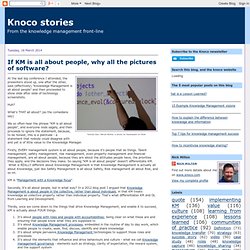

Endangered Species: The Corporate Intranet. If KM is all about people, why all the pictures of software? At the last big conference I attended, the presenters stood up, one after the other, said (effectively) "Knowledge Management is all about people" and then proceeded to show slide after slide of technology screenshots.

Huh? What's THAT all about? (as the comedians say) We so often hear the phrase "KM is all about people", and everyone nods sagely, and then proceeds to ignore the statement, because, to be honest, this is a platitude - a statement that nobody could disagree with and yet is of little value to the Knowledge Manager. Firstly, EVERY management system is all about people, because it's people that do things. KM is "Management with a Knowledge focus". Secondly, it's all about people, but in what way? Thirdly, once we come down to the things that drive Knowledge Management, and enable it to succeed, KM is actually about FOUR things.
We know it's about four things, because if any one of these is missing from your KM Framework, Knowledge Management fails. Who Really Suffers When You Don't Share Your Ideas at Work. Worried that someone at work might be stealing your good ideas?

Relax. It doesn't happen as often as you think. A study in the current issue of the Academy of Management Journal discovered employees have nothing to gain from hiding their insights from co-workers, and just end up hurting themselves by doing so. The study's authors said employees should reconsider and be careful about hiding knowledge from their peers, because what goes around comes around. "More specifically, employees who intentionally hide more knowledge seem bound to receive such selfish behavior in return from their co-workers, which will ultimately hurt them and decrease their creativity," the researchers wrote in the study.
Develop Strategic Thinkers Throughout Your Organization - Robert Kabacoff. By Robert Kabacoff | 9:00 AM February 7, 2014 In study after study, strategic thinkers are found to be among the most highly effective leaders.

And while there is an abundance of courses, books, articles and opinions on the process of strategic planning, the focus is typically on an isolated process that might happen once or twice per year. In contrast, a true strategic leader thinks and acts strategically every day. So is there a way to encourage routine strategic thinking throughout the organization? I would say yes – and that it’s the most important thing you can do as a leader. We found that a strategic approach to leadership was, on average, 10 times more important to the perception of effectiveness than other behaviors studied. Strategic leaders take a broad, long-range approach to problem-solving and decision-making that involves objective analysis, thinking ahead, and planning. So how can organizations develop strategic leaders? To be sure, it’s not an easy task. KM. Chance favours the Connected Company. About 18 months ago I wrote in Embrace Chaos, that I think the outer edge will be where almost all high value work gets done in organizations.

Core activities will be increasingly automated or outsourced and these will be managed by very few internal staff. Change and complexity will be the norm in our work and any work where complexity is not the norm will be of of diminishing value. Riitta Raesmaa picked up on this in Embracing chaos with a little help from my friends: “Changes in the organizational culture, more open attitudes and behavior, together with social media tools and services, are altering the landscape of human connectedness and the ways of value creation.” Recently, Oscar Berg started experimenting with new ways of looking at value creation and openness. Oscar says that: Without openness, the door is closed for anyone who wants to participate.
From a value creation perspective, this can inform us how and where we should best get work done in the network era. GURTEEN KNOWLEDGE.